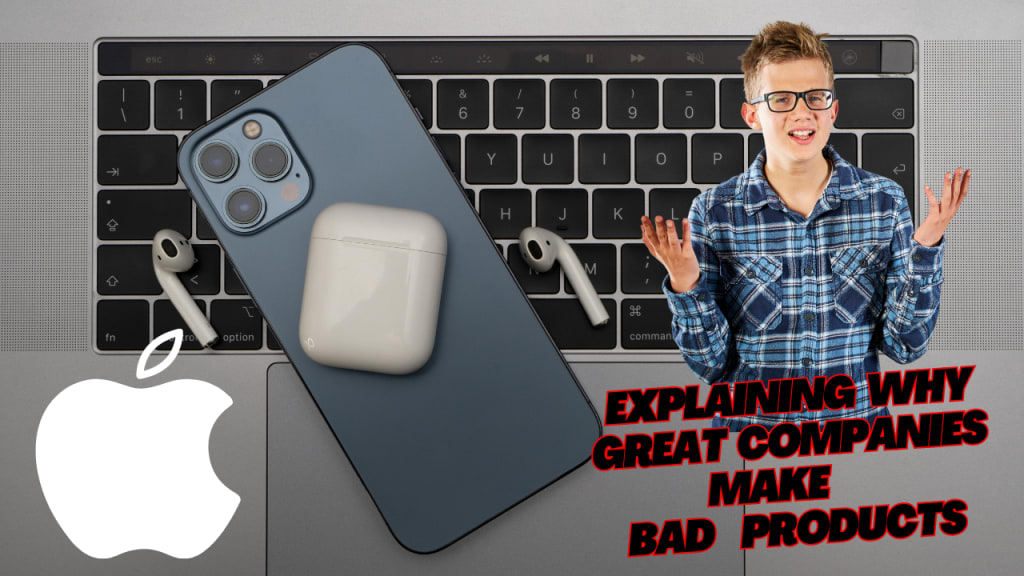Explaining Why Great Companies Make Bad Products
Great Companies Make Bad Products Which We Still Buy

The root of all product failure starts with an unclear or poorly planned vision. Most of the time, a poorly formulated vision is rooted in arrogance.
Product failures are often the result of a company's unclear or poorly planned vision. General Motors executives were reportedly ignoring negative customer feedback during early showings of the aztec minivan, despite the fact that a majority of people found it unfavorable. Despite this, GM moved forward with production anyway. Although the design received widespread criticism, it's important to note that just because something is disliked doesn't necessarily mean it's bad. History has shown that many innovative products, such as the telephone, umbrella, light bulb, and television, faced initial ridicule before gaining acceptance. This highlights the difficulty in determining whether a design is genius or foolish, as the feedback for both can be quite similar. One of the major reasons the Aztec failed was due to GM's project management approach in the past. Back then, GM was large enough to release a flawed car, conduct research post-launch, and subsequently release an improved version.
Running a large company involves establishing processes and systems, often focusing on risk reduction through multiple layers of approval and data-driven decision-making. This cautious approach is necessary to protect a company's reputation and brand. Large corporations have extensive approval processes because they have a lot to lose with every product launch. Furthermore, as corporations grow and monopolize the market, even if they produce superior products, it may not significantly impact sales since customers have no alternative choice. This monopolistic position limits the impact of a better product on overall sales. An effective strategy for corporations is to offer to manufacture an existing best-selling item for a lower price or introduce it to a wider audience.
This low-risk approach guarantees greater profits as the best-selling item is already proven to be successful. Introducing new ideas and innovative designs come with various challenges. Most design and innovation is difficult to measure, lacking readily available data for analysis. This makes it risky, and for large corporations that dislike taking risks, it becomes a significant hurdle. Consequently, those involved in innovation and design are often undervalued compared to sales and marketing personnel within larger corporations. In line with this thinking, Apple's CEO, Tim Cook, focuses on expanding the market for Apple's existing products rather than creating completely new markets. This approach minimizes risk, as Apple already has a decent line of products that work well. In their perspective, reinventing the wheel is an unnecessary and risky endeavor.
Apple has demonstrated impressive innovation through its incremental improvements on chips, with the M1 chip being particularly revolutionary in various aspects. However, unlike the iPod, iTunes, and iPhone, Apple has not introduced a new product category. Prior to Apple's versions, there were already numerous music downloading sites, MP3 players, and smartphones available. Nonetheless, Apple managed to redefine these product categories and revolutionize the way we perceive them. Since the passing of Steve Jobs, new product development has not been Apple's primary focus. Nevertheless, their expansion efforts have been highly successful, as evidenced by the company's current valuation of nearly three trillion dollars, nearly ten times more than a decade ago. Nevertheless, for continued success, Apple will eventually need to redefine product categories as they have done in the past. While venturing into new ideas carries risks, it is also essential to prevent the gradual decline of a company. Perhaps their upcoming augmented reality glasses will mark the next significant leap for Apple. Given the company's size and heavy emphasis on marketing and sales, this task will undoubtedly be more challenging than ever before. Nonetheless, I remain optimistic about their prospects.
Now, let's move on to the third part of why big companies often produce subpar products. One of the main reasons is their failure to adapt. General Motors (GM), for instance, took a significant risk with the Aztec. Building a brand takes years, but it can be destroyed in mere minutes. Consequently, innovation is often seen as a threat rather than an asset in large companies. Most organizations irrationally cling to what initially brought them success, regardless of the costs. GM and Apple are not the only companies grappling with this issue; countless others face the same challenge. This resistance to change is deeply rooted in human nature, as individuals who challenge the status quo are typically marginalized or removed. Historical figures like Martin Luther King Jr. and Abraham Lincoln were assassinated for challenging prevailing beliefs, while companies may not resort to such extreme measures, they are similarly reluctant to be challenged.
A major reason why companies fail to adapt is fear. They are afraid to see the writing on the wall or venture into new areas. All of these fears stem from a lack of significant thinking about how to utilize their skills and knowledge. In my opinion, the primary reason why large companies fail is fear. They are hesitant to deviate from the tried-and-true methods. While it is not necessary to reinvent everything with each project, it wouldn't hurt to explore new possibilities. The greatest innovators had the courage and conviction to pursue their ideas. They were not driven by fear. It's normal to feel scared, but you don't have to let fear control you.





Comments
There are no comments for this story
Be the first to respond and start the conversation.